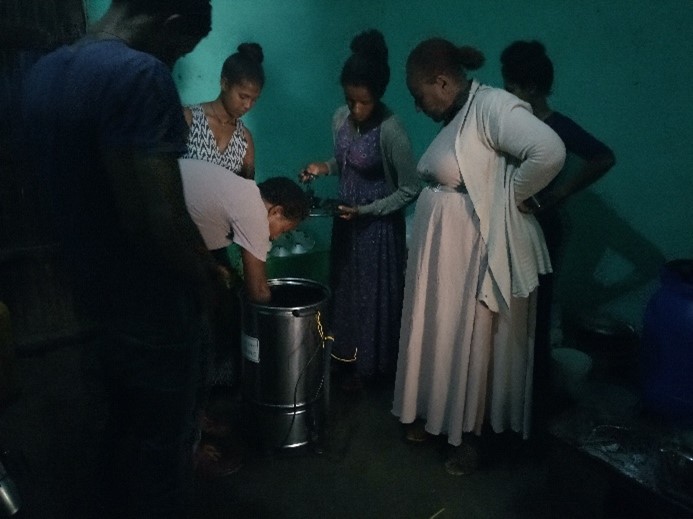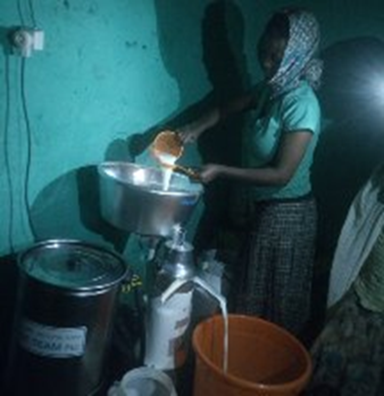Promoting Mentorship and Job Opportunities for Youth in the Dairy Value Chain
Across Ethiopia, women and youth in rural areas engage in agri-businesses to support their communities, their families, and themselves. Oftentimes, however, they face challenges such as access to resources, modernized technology, technical and management practices, and other skills needed to run and operate their businesses. To help bridge these gaps, the United States Agency for International Development (USAID)-funded Feed the Future Ethiopia Value Chain Activity (VCA), through its gender and youth team, facilitates a mentorship program for women and youth community members that links successful business owners with aspiring entrepreneurs in order to enhance their agri-business management skills.

Photo credit: Emebet Yenieneh, Gender and Youth Specialist, Amhara Region
When the mentorship program began in 2019, eight mentors were identified and trained in Ethiopia’s Amhara region. Those mentors were connected to 50 women and youth engaged in dairy and livestock value chain activities. Among them were the founders of Fekadu, Zerfalem and Friends, a dairy enterprise established in 2018 by five young people. In 2019, the Fekadu, Zerfalem and Friends founders participated in the mentorship program as mentees. They learned how to expand their business by meeting customer needs, incorporating product diversity, and new techniques for improving milk production capacity and best animal feed practices such as green forage production (which replaces dry grass and semi-processed feed for fresh greens to increase milk production). Each member also had the opportunity to engage in experience-sharing events with other successful agri-business owners to learn, ask questions, and tackle challenges, and at the same time receive technical assistance to succeed in their own business venture.
In addition to the technical assistance received, Fekadu, Zerfalem and Friends also benefitted from capacity building through VCA such as finance and business management training as well as a VCA sponsorship to attend an agricultural technologies trade fair that facilitated opportunities for information exchange and helped the founders improve knowledge, attitudes, and marketing practices.
As part of the program, enterprise members also worked with their mentor to jointly develop a business action plan that outlined steps for expansion and defined a vision for the future. Through mentor support, Fekadu, Zerfalem and Friends was quickly able to increase production and expand its business. Prior to working with VCA, Fekadu, Zerfalem and Friends produced 123 liters of milk/day, earning an average daily profit of 1350 ETB (30 USD). After engagement with the mentorship program, they increased earnings by more than two and a half times to 3620 ETB or 82 USD/day and opened a café to sell a variety of milk-based products. They also sold a cow in order to purchase a cream separator and butter churning machine, allowing them to diversify their business to process butter and cheese.
Now, in 2021, Fekadu, Zerfalem and Friends produces 160 liters of milk/day from their own farm and the enterprise serves as a milk collection center for other neighboring smallholder farmers, collecting an additional 250 liters/day and stimulating other local businesses. With this growth, they have attracted government partners including the region’s Agricultural Growth Program’s steering committee (responsible for leading decisions regarding agribusinesses operating in the area), which offered an existing building to use as a local milk processing center.

Photo credit: Emebet Yenieneh, Gender and Youth Specialist, Amhara Region
These efforts were further complemented by VCA selecting the enterprise as a dairy technology demonstration center. Through its Technology Fund, VCA provided milk containers, measuring tools, a chopper[1], and a milking machine. The support resulted in a daily profit of approximately 11,100 ETB (254 USD) through sales of milk, sour cream, butter, cheese, and milk by-products; over eight times their daily earnings prior to engaging in VCA activities in 2019. In addition, the increased business has led to a higher consumption of dairy products among employees and improved nutrition and health status.
With all its success, Fekadu, Zerfalem and Friends was able to purchase 10 additional young cows and three refrigerators to support increased milk production and storage, as well as needed supplies for its café. The business was also able to provide full-time employment for the owners and create jobs for five previously unemployed youth to earn a living, comfortably pay expenses, and grow professionally. As one of the founders shared:
“Working in this type of business is more than the money they earn, it is a learning center to gain practical milk processing, marketing, and communication skills.”
Fekadu, Zerfalem and Friends has fostered its own business environment and the owners and employees alike have shared that their business skills and confidence have improved. They will soon establish milk processing technologies and as they look ahead to the future they hope to grow their presence in the milk processing industry.
Through its engagement with VCA, Fekadu, Zerfalem and Friends’ has come full circle over the last two years. The business recently hosted 40 smallholder farmers for an experiential visit and engaged its founders to serve as mentors for a new group of mentees who will become future business leaders and support economic growth in the region.
[1] A chopper is a type of machine that can chop grass and biproducts to support cattle feed processing.
